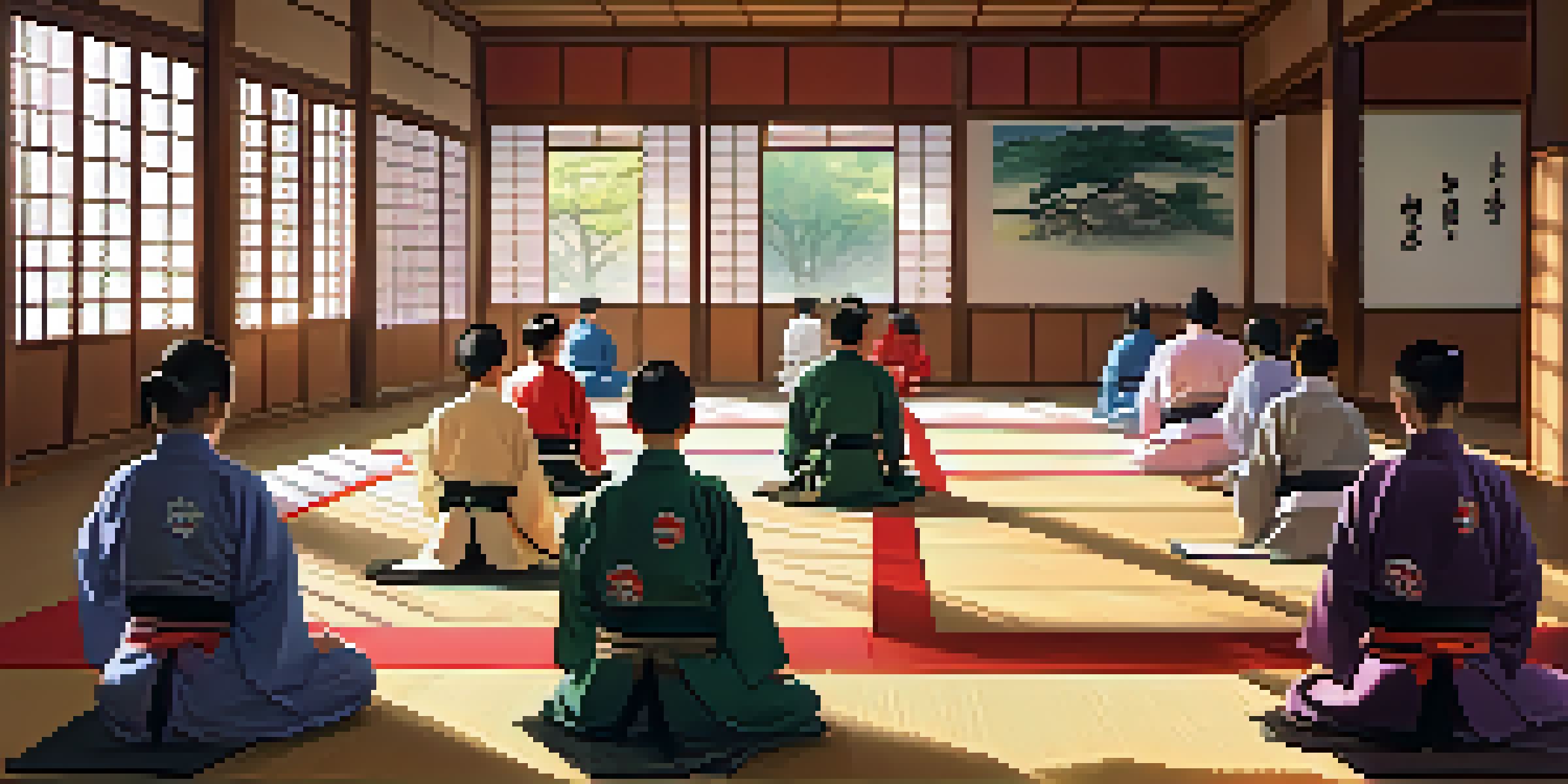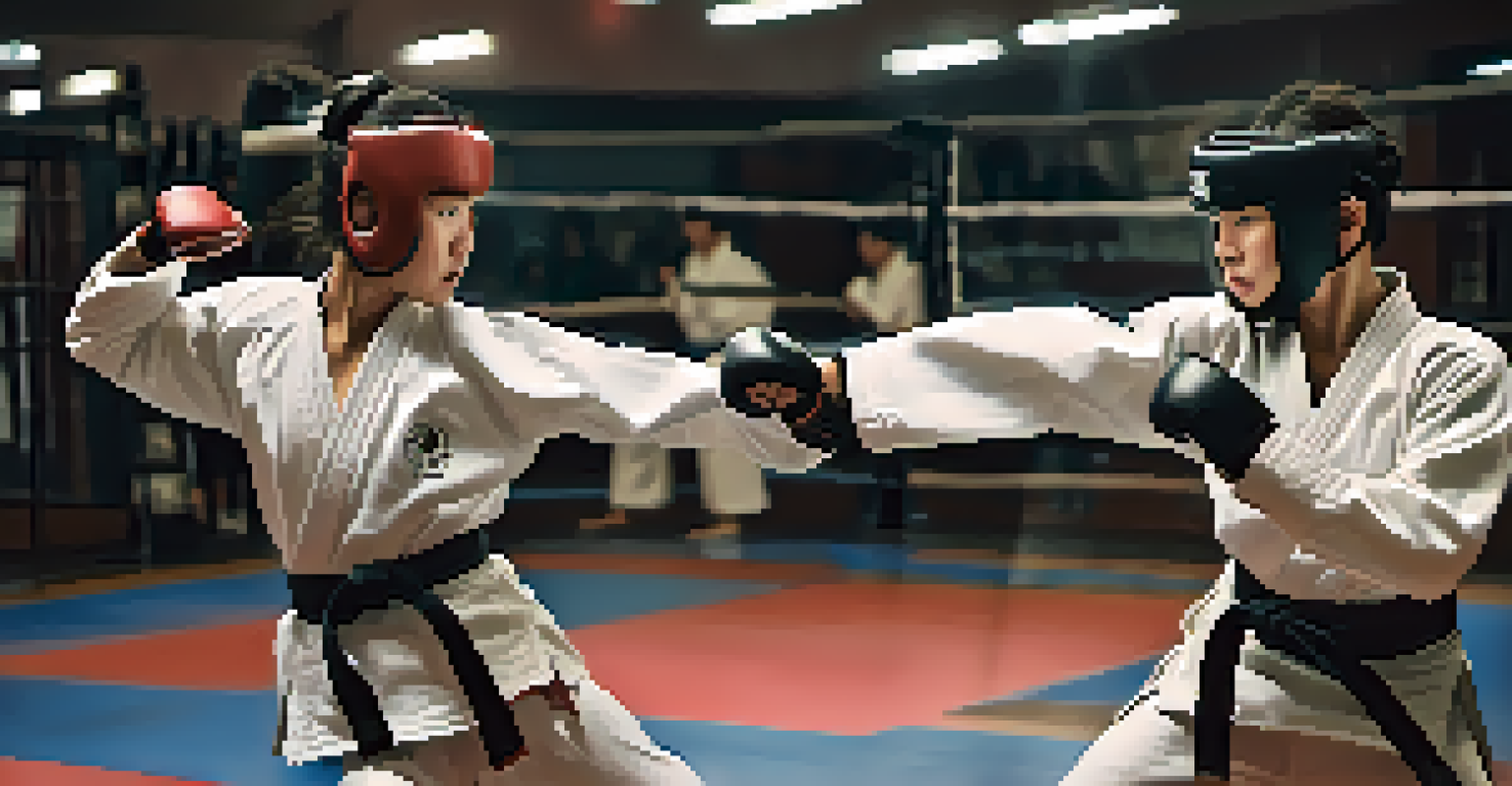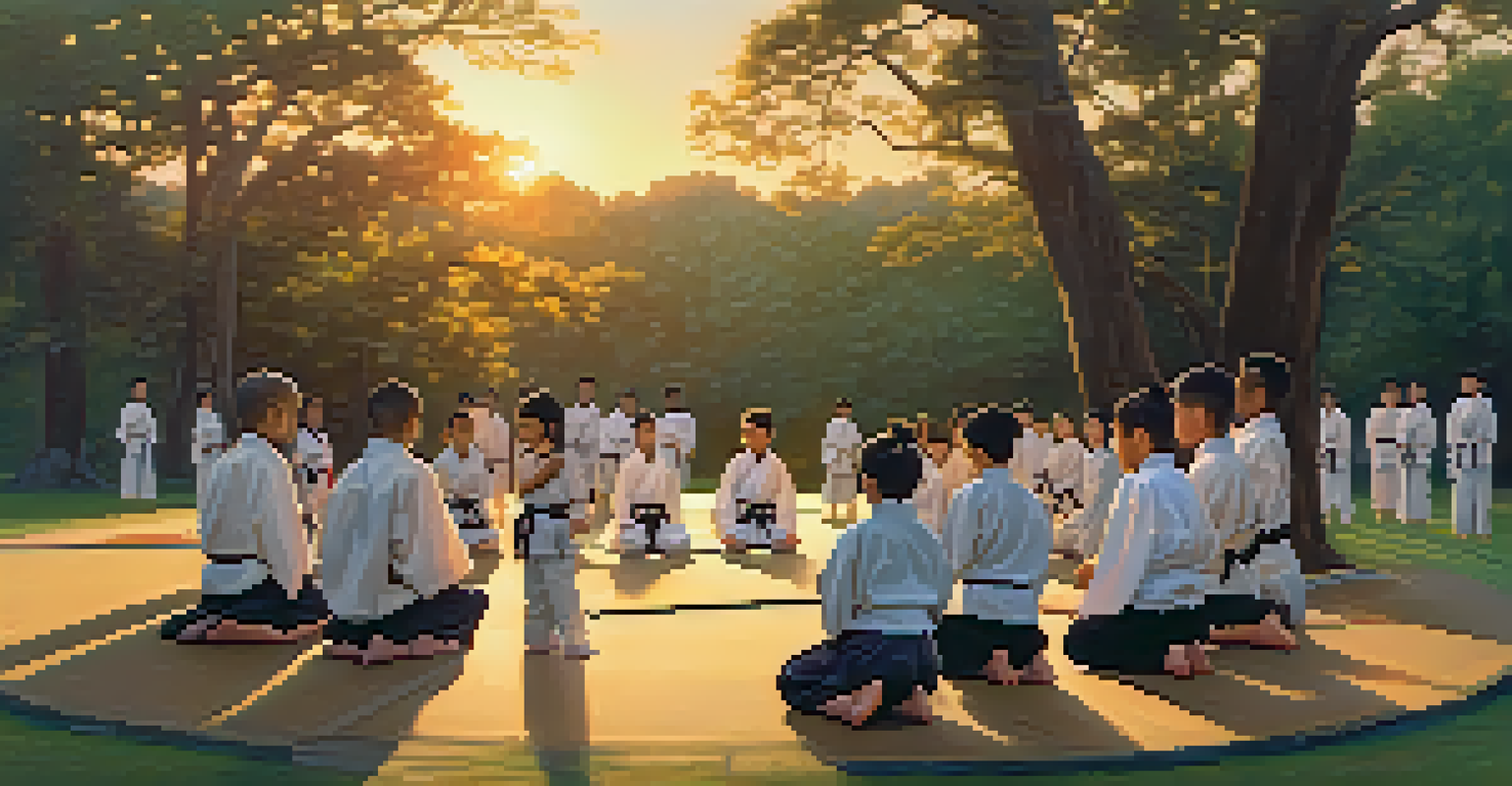How Martial Arts Teaches Respect and Personal Responsibility

Understanding Respect in Martial Arts Training
Respect is a foundational principle in martial arts, often embedded in the very fabric of its practice. Students learn to bow to their instructors and peers, signifying acknowledgment of each other’s efforts and dedication. This ritual teaches that respect is not just about showing deference, but also about valuing the contributions of others.
Respect is not given, it is earned.
As practitioners advance through ranks, they gain a deeper appreciation for the journey and the respect that comes with it. For instance, a white belt may look up to a black belt, not just for their skill, but for their commitment to the art. This dynamic fosters a culture where respect is reciprocated, creating a supportive learning environment.
Moreover, the understanding of respect extends beyond the dojo walls. Students often carry these lessons into their daily lives, treating others with kindness and consideration. This transformation is a testament to martial arts as a vehicle for personal growth and social harmony.
The Role of Discipline in Building Personal Responsibility
Discipline is key in martial arts, as practitioners must consistently train and refine their skills. This commitment teaches students that personal responsibility is essential for growth, both as martial artists and as individuals. By adhering to a training regimen, they learn to hold themselves accountable for their progress.

For example, missing classes can set a student back, making them realize the importance of dedication. This realization fosters a sense of ownership over their learning journey, pushing them to prioritize their training. The discipline cultivated through martial arts translates into other areas of life, such as academics or careers.
Respect Shapes Martial Arts Culture
Respect is fundamental in martial arts, fostering a supportive environment where students value each other's contributions and experiences.
In essence, discipline in martial arts is not merely about following rules; it’s about developing a proactive mindset. Students begin to understand that their choices directly impact their success, guiding them to make more responsible decisions outside of the dojo.
Learning Accountability Through Sparring
Sparring in martial arts is a unique practice that emphasizes accountability. When students engage in controlled combat, they must take responsibility for their actions, whether it’s a well-placed kick or an accidental strike. This interactive experience teaches them that their decisions can have immediate consequences.
Discipline is the bridge between goals and accomplishment.
As they grapple with opponents, students learn to assess their strengths and weaknesses, fostering self-awareness. For instance, a student may realize that their overconfidence led to a missed opportunity in sparring, prompting them to reflect on their strategy. This process encourages them to be honest about their abilities and work on areas needing improvement.
Ultimately, sparring becomes a metaphor for life; the ability to recognize and own one's actions is crucial. By learning to be accountable in a sparring match, students are better equipped to face challenges in their everyday interactions and responsibilities.
The Importance of Respecting the Art and Its History
Every martial art carries a rich history and tradition that deserves respect. Students are often taught about the origins and philosophies behind their chosen discipline, fostering a deeper connection to the art. This respect for history not only honors the founders but also reinforces the importance of cultural heritage.
Understanding the struggles and triumphs of those who came before them cultivates gratitude in students. They learn that they are part of a larger community, and this sense of belonging encourages them to respect their peers and mentors. It’s a reminder that martial arts is more than just physical skill; it’s a legacy.
Discipline Fosters Personal Growth
The discipline learned in martial arts encourages personal responsibility and accountability, impacting students' lives beyond the dojo.
Furthermore, this respect extends to the practice itself. Students are taught to care for their training spaces and equipment, understanding that maintaining these elements is part of honoring the art. This conscientious approach instills a sense of responsibility that permeates all aspects of their lives.
Building Empathy Through Partner Work
Partner drills and exercises in martial arts encourage empathy among students. By working closely with others, they learn to understand different perspectives and body types. This collaboration fosters a sense of camaraderie, as students support each other’s growth and development.
For example, when practicing techniques, students must consider their partner’s comfort and safety. This awareness promotes kindness and sensitivity, teaching them to navigate relationships with care. The ability to empathize with others is a crucial life skill, making martial arts a powerful tool for social development.
In turn, these lessons in empathy empower students to become more compassionate individuals. Whether in the dojo or in everyday life, they learn the value of considering others’ feelings, which enhances their interactions and relationships in meaningful ways.
Setting Goals and Achieving Personal Accountability
Martial arts is structured around clear goals, such as earning belts or mastering techniques. This goal-setting process encourages students to take personal responsibility for their progress. They quickly learn that achieving these milestones requires dedication, practice, and perseverance.
For instance, a student may set a goal to earn their next belt within a certain timeframe. This commitment instills a sense of accountability, as they must assess their training habits and make adjustments to reach that goal. The journey teaches them the importance of hard work and the satisfaction that comes from achieving what they set out to do.
Empathy Enhances Community Connections
Through partner work and mutual support, martial arts cultivates empathy, promoting compassionate interactions both in training and daily life.
Ultimately, the ability to set and reach personal goals in martial arts translates to other life pursuits. Whether it’s academic achievements or career aspirations, students develop a proactive mindset that empowers them to take charge of their lives.
Respecting Others: Lessons Beyond the Dojo
The values learned in martial arts extend well beyond the training mat. Students are often encouraged to show respect not only to fellow practitioners but to everyone they encounter. This outward expression of respect fosters a more harmonious environment in their communities.
For example, a martial artist may find themselves resolving conflicts peacefully, using the communication skills honed during training. The lessons of respect and responsibility empower them to act as positive role models, inspiring others to embrace these values. It’s a ripple effect that can transform social dynamics.

Ultimately, the respect cultivated through martial arts becomes a way of life. Practitioners learn that every interaction is an opportunity to demonstrate the principles they’ve embraced, creating a more compassionate world.